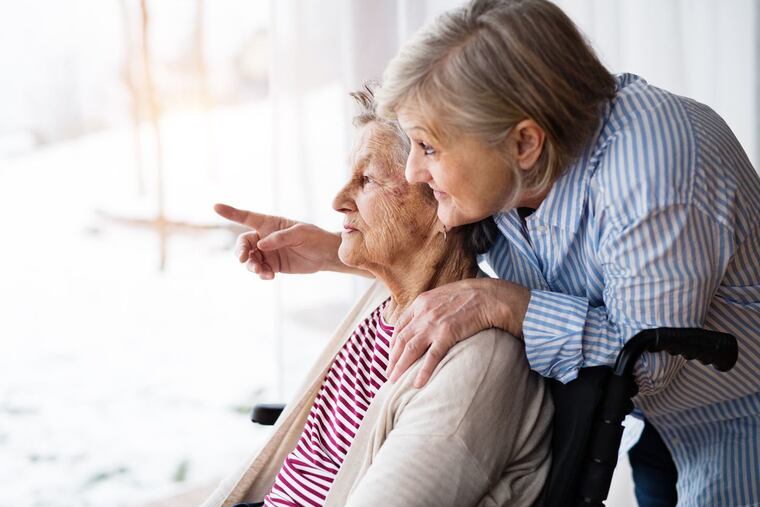Millions of family caregivers wish they’d gotten more training, AARP report says
Caregivers need more training and support, especially for complex medical tasks.

This will come as little surprise to the nation's 40 million caregivers, but a new report from AARP is a reminder to everyone else that caregivers are doing complicated, stressful work with inadequate training and support.
The report, called “Home Alone Revisited,” was released Wednesday at the annual meeting of the American Society on Aging. It was an update of a similar examination of caregiving in 2012 and was produced by the Founders of the Home Alone Alliance: AARP, United Hospital Fund, Family Caregiver Alliance, and the Betty Irene Moore School of Nursing at the University of California, Davis.
The online survey of 2,089 family caregivers found that many believed their efforts were keeping a loved one out of a nursing home, but were worried about making mistakes when it came to their medical duties.
Half were performing medical or nursing care ranging from helping with assistive devices to operating home dialysis equipment.
“We’re talking 20 million people,” said Susan Reinhard, senior vice president and director of AARP Public Policy Institute. “It’s a tremendous amount of people.”
The report concluded that caregivers are still having to learn too many medical and nursing tasks on their own, including how to manage incontinence and prepare special diets. Of those whose loved one had been hospitalized in the last year, 60 percent said they had received instruction on post-discharge care-giving, but the report said hospitals still need to do a better job of identifying family caregivers and telling them what to expect at discharge.
Forty-two states, including New Jersey and Pennsylvania, have passed the CARE Act, Reinhard said. It requires hospitals to ask patients about family caregivers and to offer training to caregivers if complex care will be needed after discharge.
“In the current health-care environment, it is presumed that every home is a potential hospital and every service that the person needs can be provided by an unpaid family member, with only occasional visits by a primary-care provider, nurse, or therapist,” the report said. It added that the demands of care-giving leave too many family members “isolated and with mental and physical health problems of their own.”
Family caregivers, it said, should be considered a valuable part of the health-care team and not taken for granted or, “worse, criticized for their perceived failures and inadequacies.”
Other highlights of the report include:
82 percent of caregivers managed medications, and half prepared special diets.
37 percent provided wound care, and 30 percent managed incontinence.
Caregivers from the baby boom generation averaged 28 hours per week of help, compared with 19 hours for Generation X caregivers and 18 for millennials.
The most emotionally challenging task was managing incontinence with disposable briefs.
Four in 10 caregivers who help with medical tasks are men. They are less likely than women to receive professional instruction.
70 percent of caregivers who perform medical tasks are managing pain; 80 percent of them say that’s stressful.
Most older caregivers felt they had no choice but to take on medical tasks.
AARP has produced a series of videos that address many of the common care-giving problems highlighted in the report, including new ones on special diets and incontinence. You can find them here.